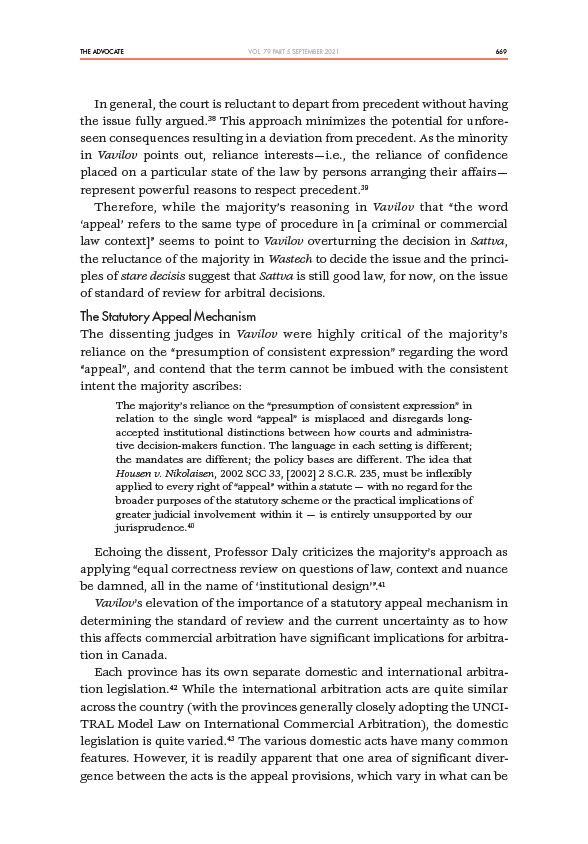
THE ADVOCATE 669
VOL. 79 PART 5 SEPTEMBER 2021
In general, the court is reluctant to depart from precedent without having
the issue fully argued.38 This approach minimizes the potential for unforeseen
consequences resulting in a deviation from precedent. As the minority
in Vavilov points out, reliance interests—i.e., the reliance of confidence
placed on a particular state of the law by persons arranging their affairs—
represent powerful reasons to respect precedent.39
Therefore, while the majority’s reasoning in Vavilov that “the word
‘appeal’ refers to the same type of procedure in a criminal or commercial
law context” seems to point to Vavilov overturning the decision in Sattva,
the reluctance of the majority in Wastech to decide the issue and the principles
of stare decisis suggest that Sattva is still good law, for now, on the issue
of standard of review for arbitral decisions.
The Statutory Appeal Mechanism
The dissenting judges in Vavilov were highly critical of the majority’s
reliance on the “presumption of consistent expression” regarding the word
“appeal”, and contend that the term cannot be imbued with the consistent
intent the majority ascribes:
The majority’s reliance on the “presumption of consistent expression” in
relation to the single word “appeal” is misplaced and disregards longaccepted
institutional distinctions between how courts and administrative
decision-makers function. The language in each setting is different;
the mandates are different; the policy bases are different. The idea that
Housen v. Nikolaisen, 2002 SCC 33, 2002 2 S.C.R. 235, must be inflexibly
applied to every right of “appeal” within a statute — with no regard for the
broader purposes of the statutory scheme or the practical implications of
greater judicial involvement within it — is entirely unsupported by our
jurisprudence.40
Echoing the dissent, Professor Daly criticizes the majority’s approach as
applying “equal correctness review on questions of law, context and nuance
be damned, all in the name of ‘institutional design’”.41
Vavilov’s elevation of the importance of a statutory appeal mechanism in
determining the standard of review and the current uncertainty as to how
this affects commercial arbitration have significant implications for arbitration
in Canada.
Each province has its own separate domestic and international arbitration
legislation.42 While the international arbitration acts are quite similar
across the country (with the provinces generally closely adopting the UNCITRAL
Model Law on International Commercial Arbitration), the domestic
legislation is quite varied.43 The various domestic acts have many common
features. However, it is readily apparent that one area of significant divergence
between the acts is the appeal provisions, which vary in what can be